新初中英语语法知识—情态动词的分类汇编含解析
初中情态动词知识点归纳

初中情态动词知识点归纳情态动词一.专题知识梳理知识点1:情态动词特征1)情态动词(modal verb)本身有词义,表示说话人的语气或情态。
2)情态动词没有人称,数的变化,后跟动词原型。
知识点2:常见情态动词用法1)can(1).表示能力、许可、可能性。
表示能力时一般译为“能、会”,即有种能力,尤其是生来具备的能力,此时may和must均不可代替它。
如:She can swim fast, but I can’t . 她能游得很快,但我不能。
I can see with my eyes.我用眼睛看。
(2).表示许可,常在口语中。
如:You can use my dictionary. 你可以用我的字典。
2)could(1).can的过去式,意为“能、会”,表示过去的能力。
如:He could write poems when he was 10. 他十岁时就会写诗。
(2). could在疑问句中,表示委婉的语气,此时could没有过去式的意思。
如:Could you do me a favor?你能帮我个忙吗?—Could I use your pen? 我能用一下你的钢笔吗?—Yes, you can.可以。
(注意回答)3)must(1).must表示主观看法,意为“必须、一定”。
Must I hand in my homework right now? 我必须现在交作业吗?(2)其否定形式mustn’t表示“一定不要” “千万别” “禁止,不许”如:You mustn’t play with fire. 你不许玩火。
You mustn’t be late.你一定不要迟到。
(3)对must引导的疑问句,肯定回答为must,否定回答为needn’t 或don’t have to .如:—Must I finish my homework?我现在必须完成作业吗?—No, you needn’t.不,你不必。
(完整版)初中情态动词用法总结

一情态动词的用法和辨析,情态动词表示推测和可能,由情态动词引导的一般疑问句的回答。
二 1 只是情态动词: can, could, may, might, must2 可做情态动词,可做实义动词: need, dare3 可做情态动词,可做助动词: will, would, shall, should4 特殊: have to, ought to, used to三 1 有一定的词义,但不能单独作谓语,必须与行为动词和系动词连用构成谓语。
2 无人称和数的变化。
( have to 除外)Eg: He has to stay here.3 后接动词原形。
4 具有助动词作用,可构成否定,疑问或简短回答。
四① 表示能力,“能,会”。
Eg : Can you play basketball?② 表示怀疑,猜测,常用于否定句或疑问句。
Eg :Li hua can’t be in the classroom.③ 表示请求,允许,多用于口语,译“可以”= may.Eg: youcangonow.④can 开头的疑问句,肯定句,否定句用 can 或 can’t.①can 的过去式,表示过去的能力。
Eg :I could swim when I was seven years old.②could 开头的疑问句,肯定和否定回答用 could, couldn’ t 如果 could 表示现在的委婉,用 can 回答。
Eg: Could I have a drink? Yes, you can.① 表示推测,“可能,也许”,用于肯定句。
Eg: He may come tomorrow.② 表示请求,“许可,可以”。
Eg: May I borrow your book?注:表示请求,许可时,主语为第一人称的一般疑问句,否定回答用 mustn’t“不可以,禁止,不许”,不用may not“可能不”。
③表示祝愿。
Eg :May you success.①表示“可以”,用于过去时中。
中考英语情态动词考点总结与归纳
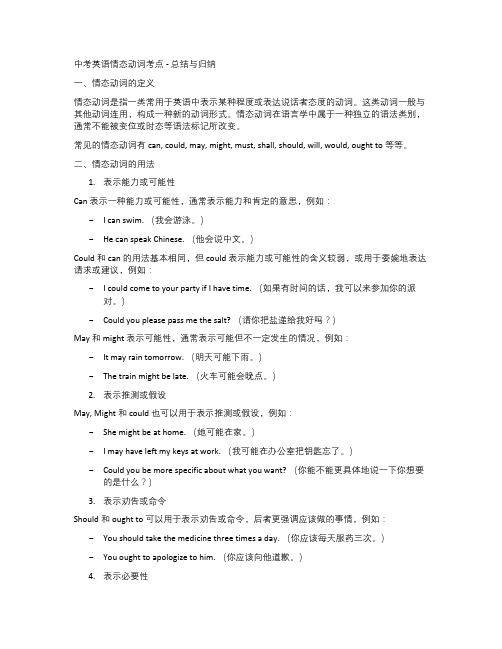
中考英语情态动词考点 - 总结与归纳一、情态动词的定义情态动词是指一类常用于英语中表示某种程度或表达说话者态度的动词。
这类动词一般与其他动词连用,构成一种新的动词形式。
情态动词在语言学中属于一种独立的语法类别,通常不能被变位或时态等语法标记所改变。
常见的情态动词有 can, could, may, might, must, shall, should, will, would, ought to 等等。
二、情态动词的用法1.表示能力或可能性Can 表示一种能力或可能性,通常表示能力和肯定的意思,例如:-I can swim. (我会游泳。
)-He can speak Chinese. (他会说中文。
)Could 和 can 的用法基本相同,但 could 表示能力或可能性的含义较弱,或用于委婉地表达请求或建议,例如:-I could come to your party if I have time. (如果有时间的话,我可以来参加你的派对。
)-Could you please pass me the salt? (请你把盐递给我好吗?)May 和 might 表示可能性,通常表示可能但不一定发生的情况,例如:-It may rain tomorrow. (明天可能下雨。
)-The train might be late. (火车可能会晚点。
)2.表示推测或假设May, Might 和 could 也可以用于表示推测或假设,例如:-She might be at home. (她可能在家。
)-I may have left my keys at work. (我可能在办公室把钥匙忘了。
)-Could you be more specific about what you want? (你能不能更具体地说一下你想要的是什么?)3.表示劝告或命令Should 和 ought to 可以用于表示劝告或命令,后者更强调应该做的事情,例如:-You should take the medicine three times a day. (你应该每天服药三次。
初一知识点解析情态动词用法总结

初一知识点解析情态动词用法总结情态动词是英语中重要的语法成分之一,它们用来表达说话人的意图、态度、推测、建议、能力等。
在初中英语学习中,掌握情态动词的用法对于提高语言表达能力非常重要。
本文将对初一学生常见的情态动词进行解析,并总结其用法。
1. Can"Can"是用来表示能力或允许的情态动词。
当它用于肯定句时,表示某人具备完成某事的能力;当它用于否定句时,表示某人不具备完成某事的能力。
例如:- I can swim.(我会游泳。
)- She can't play the piano.(她不会弹钢琴。
)2. Could"Could"是"can"的过去式形式,表示过去某一时刻的能力或允许的情态动词。
它也可以用于表示请求或提议。
例如:- When I was a child, I could climb trees.(当我还是个孩子的时候,我会爬树。
)- Could you lend me your pen, please?(请你借给我你的笔好吗?)"May"用来表示许可、请求或建议,也常用于表示可能性。
例如:- May I go to the bathroom?(我可以去洗手间吗?)- You may want to consider studying harder.(你可能需要考虑更加努力学习。
)4. Might"Might"是"may"的过去式形式,用来表示过去某一时刻的可能性;也可用于表示虚拟语气。
例如:- It might rain later.(后面可能会下雨。
)- If I had studied harder, I might have passed the test.(如果我学得更努力些,我可能会通过考试。
)5. Must"Must"表示义务、必须以及推测的一种情态动词。
八年级情态动词知识点归纳
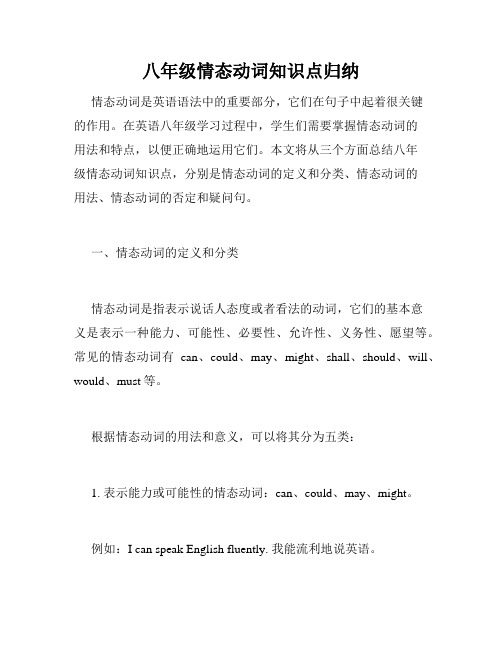
八年级情态动词知识点归纳情态动词是英语语法中的重要部分,它们在句子中起着很关键的作用。
在英语八年级学习过程中,学生们需要掌握情态动词的用法和特点,以便正确地运用它们。
本文将从三个方面总结八年级情态动词知识点,分别是情态动词的定义和分类、情态动词的用法、情态动词的否定和疑问句。
一、情态动词的定义和分类情态动词是指表示说话人态度或者看法的动词,它们的基本意义是表示一种能力、可能性、必要性、允许性、义务性、愿望等。
常见的情态动词有can、could、may、might、shall、should、will、would、must等。
根据情态动词的用法和意义,可以将其分为五类:1. 表示能力或可能性的情态动词:can、could、may、might。
例如:I can speak English fluently. 我能流利地说英语。
2. 表示建议或命令的情态动词:shall、should。
例如:You should go to bed early. 你应该早点睡觉。
3. 表示必要性或义务的情态动词:must、have to。
例如:You must finish your homework. 你必须完成你的作业。
4. 表示意愿或决心的情态动词:will、would。
例如:I will help you with your English. 我会帮你做英语。
5. 表示推测和猜测的情态动词:may、might、could。
例如:He may be late for the meeting. 他也许会迟到会议。
二、情态动词的用法情态动词的用法有以下几点:1. 情态动词后面要接动词原形。
例如:I can swim. 我会游泳。
2. 情态动词没有人称和数的变化。
例如:You can ride a bike. 你会骑自行车。
3. 情态动词不能单独作为谓语动词,必须与其他动词一起使用。
例如:She should study harder. 她应该更努力地学习。
人教版英语情态动词(完整版)含解析
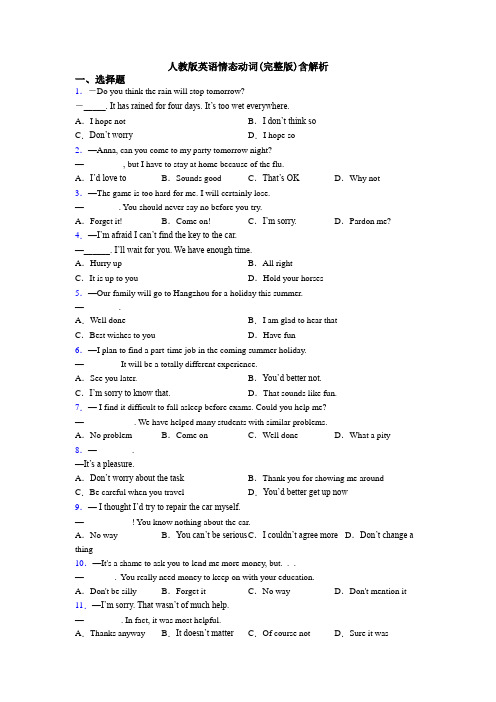
人教版英语情态动词(完整版)含解析一、选择题1.-Do you think the rain will stop tomorrow?-_____. It has rained for four days. It’s too wet everywhere.A.I hope not B.I don’t think soC.Don’t worry D.I hope so2.—Anna, can you come to my party tomorrow night?—_________, but I have to stay at home because of the flu.A.I’d love to B.Sounds good C.That’s OK D.Why not 3.—The game is too hard for me. I will certainly lose.—________. You should never say no before you try.A.Forget it! B.Come on! C.I’m sorry.D.Pardon me? 4.—I’m afraid I can’t find the key to the car.—______. I’ll wait for you. We have enough time.A.Hurry up B.All rightC.It is up to you D.Hold your horses5.—Our family will go to Hangzhou for a holiday this summer.—________.A.Well done B.I am glad to hear thatC.Best wishes to you D.Have fun6.—I plan to find a part-time job in the coming summer holiday.—________ It will be a totally different experience.A.See you later. B.You’d better not.C.I’m sorry to know that.D.That sounds like fun.7.— I find it difficult to fall asleep before exams. Could you help me?— ___________. We have helped many students with similar problems.A.No problem B.Come on C.Well done D.What a pity 8.—________.—It’s a pleasure.A.Don’t worry about the task B.Thank you for showing me aroundC.Be careful when you travel D.You’d better get up now9.—I thought I’d try to repair the car myself.— __________ ! You know nothing about the car.A.No way B.You can’t be serious C.I couldn’t agree more D.Don’t change a thing10.—It's a shame to ask you to lend me more money, but. . .— ______ . You really need money to keep on with your education.A.Don't be silly B.Forget it C.No way D.Don't mention it 11.—I’m sorry. That wasn’t of much help.— ________. In fact, it was most helpful.A.Thanks anyway B.It doesn’t matter C.Of course not D.Sure it was12.—I’m so sorry to keep you waiting for me so long.— ________!A.With pleasure. B.Don’t say so C.I don’t think so D.It doesn’t matter 13.—I prefer western food. It’s delicious and good for us.—_______ ? But western food is said to be high in sugar and fat.A.Is that right B.How do you know thatC.Do you really think so D.Who told you that14.—Can I look at the menu for a few more minutes before I decide?—Of course. ________, Sir.A.Make yourself at home B.Enjoy yourself C.It doesn’t matterD.Take your time15.— Could you please clean your room?—_________. I’ll do it at once.A.Yes, sure B.Sorry, I can’t C.It doesn’t matter D.Here you are 16.— What do you think of the movie Mr. Bea ?— ____. It’s very funny.A.I can’t stand it .B.I don’t mind it C.I love it. D.I hate it. 17.—Would you please help me with my spoken English?—__________. First you should know practice makes perfect.A.That’s right B.No problem C.Quite well D.No, thanks 18.— Shall we go to Nanjing Green Expo Park to enjoy the beautiful flowers this afternoon?—________. Let’s go there by bike.A.I think so B.That’s all right C.My pleasure D.Sounds great 19.—I have got a new job as a presenter in the Wenzhou Radio Station!—________.A.Come on B.Good idea C.Congratulations D.All right 20.—Why not take your son to watch the new film A Little Red Flower?—__________.A.Good idea B.No problem C.Good luck D.No way 21.—Do you like cartoons or scary movies?—_______. They can cheer me up.A.Yes, I do B.No, I don't C.Cartoons D.Scary movies 22.—Excuse me, can you give me some water? The cup is empty.—________A.Go ahead. B.My pleasure C.At your service D.You’d better not. 23.—You seem so happy today, Jack.—________? I won the first prize in the singing competition yesterday.A.So what B.How come C.Guess what D.Why not 24.—Susan, will you please go and empty that drawer?— _________ ?A.What for B.What is it C.How is it D.How come 25.—It’s been a wonderful party. Thank you very much?—- ________________.A.With pleasure B.No , thanks C.It’s OK D.I’m glad you enjoyed it .26.—________!—Yes. It sounds gentle and relaxing.A.How good the vegetable soup is B.How exciting the storybook isC.What nice music Ann is playing D.What a beautiful flower Jim keeps 27.—All of Mark Twain’s novels are popular.— ________. Especially The Adventures of Tom Sawyer.A.I can’t agree more B.That’s not the case C.That’s not the point D.Don’t mention it 28.—How would you like your soup?—________.A.Very delicious B.With some tomatoes and eggs, pleaseC.I like it very much D.No, thanks29.—Don’t keep the water running when you brush your teeth.— ________ .A.I hope so B.I’m afraid not C.Sorry, I won’t D.It’s nothing 30.— Why will you take part in the charity walk? You are not good at running at all.— ________. I run to show that I can help others.A.Not exactly B.That’s not the point C.I can’t agree more D.It sounds like a pity 31.—Shall we go to the amusement park right away or the day after tomorrow?—________. Any time will do.A.Excuse me B.Have a good timeC.It’s up to you D.I’m afraid I can’t32.—How do you like coffee, Minnie?—It tastes very terrible. ________.A.I have no idea B.I don’t mind it C.I really can’t stand it D.I can’t afford it 33.— Mr. Smith, I won the first prize in the competition.—______ I think you’ll do better and better.A.Congratulations! B.Good idea! C.That’s all right!D.What a shame! 34.—Oh, my love, you say you have ordered a dozen cups of bubble tea (奶茶)?—________A.Agree. B.Forget it. C.I really do. D.Are you kidding me? 35.—He is too short to be a successful basketball player.—________ Every dog has its day.A.I think so. B.It’s hard to say.C.That’s right.D.You’d better not. 36.— May I have a look at the newspaper China Daily?— Certainly. ________A.Thank you. B.It’s a pity.C.Here you are. D.I’d like to. 37.—I just got a message from Ms. Yang and she said she would come to our meeting this afternoon.— She always has good ideas.A.Why not? B.What a pity! C.Time is up. D.That’ll be very nice. 38.— Mike, are you ready for the coming final exam?— ________. I have prepared it for weeks.A.You bet B.No deal C.Bad luck D.Have fun 39.—Can you tell me how to get to the park?—________—Thank you all the same.A.Show me the map, please.B.Certainly. It’s opposite the museum.C.Sorry, I don’t know. I’m a stranger here.D.Sure. Turn right and go along Rock Road.40.—How about buying that coat?—________. It’s too expensive. I can’t afford it.A.That sounds good B.No way C.Good idea D.What a pity 41.—I wonder if Tenny is doing well in her new school.—________. She is old enough to look after herself well.A.You’re welcome B.Good luck C.It’s a pity D.No need to worry 42.— Wow, what a good smell! Can I have a piece of cake?— ________A.No way. B.Good idea! C.HeIp yourself. D.What a pity! 43.— Would you mind my turning on the TV? The New Year concert has just begun.— ________. Just go ahead.A.Please don’t B.Better not C.Of course not D.I’m afraid not 44.—Mum, Joe has broken a cup!—________. Accidents always happen.A.Pretty good B.Of course C.It doesn’t matter D.That depends 45.—We’ll study in different schools next term. I hope you’ll enjoy your time in the new school!—________A.I’ll take your advice. B.The same to you. C.Congratulations!D.It doesn’t matter.46.— The movie Lost in Russia sends a message about the importance of family.— ________. It reminds me of my parents.A.I hope so B.That’s all right C.You bet D.I don’t think so 47.— Michael was late for Mr. Smi th’s chemistry class this morning.—________? As far as I know, he never came late to class.A.So what B.Why not C.How come D.Who cares 48.— Are you feeling any better now after taking the medicine?—________. I’m feeling even worse.A.You got it B.Never mind C.Sorry to hear that D.Quite the opposite49.—Another Friday! Let’s go to see the play tonight.—________ I will book the tickets online.A.My pleasure. B.That’s right.C.Why not? D.Never mind. 50.—I love the Internet. I’ve come to know many friends on the net.—________. Few of them would become your real friends.A.I can’t agree more B.I’m pleased to know thatC.That’s for sure D.That’s not the case【参考答案】***试卷处理标记,请不要删除一、选择题1.D【解析】试题分析:I hope not我希望不是,I don’t think so我不认为这样,Don’t worry不要担心,I hope so我希望如此。
2021年初中英语语法之情态动词

初中英语语法之情态动词初中英语语法大全之情态动词①常见的情态动词有:can (could) , ___y (might),must ,shall (should), will (would), dare (dared) , need等,另外,have to、had better也当作情态动词使用。
情态动词后面必须加动词的原形。
②can表示体力、脑力方面的能力或客观的可能性。
口语中, 在询问或说明一件事可不可以做时,常用“can”代替“ ___y”。
情态动词“can”的过去式是“could”,否定式是“cannot”通常缩写成“can’t”,“could”的`否定式是“could not”,通常缩写成“couldn’t”。
如:Can I help you?(要帮忙吗?)/ He can swim.(他会游泳)/ That can’t be Mr Li.(那不可能是李先生)③ ___y表示允许、请求或可能性,用 ___y提问时,肯定回答一般用Certainly或Yes,you ___y.;否定回答一般用can’t或mustn’t. 如:May I ask you a question?—Certainly.(可以问你一个问题吗?当然可以)/ You ___y go now.(现在你可以走了)/ It ___y be in your pocket.(它可能在你的衣袋里)④ must表示“必须”、“一定”的意思。
表示“必须”时否定形式是mustn’t;表示“一定”时,否定形式是“can’t”如:We must be very careful when we cross the road.(我们过马路时一定要非常小心)/ It must be Jack.(那准是杰克)/ I haven’t seen Kate today. She can’t be here.(我今天没有看到过凯特,她不可能在这里)[注意]用must(必须)进行提问时,肯定回答用must,否定回答用needn’t;用must(一定)进行提问时,肯定回答仍用must,但是否定回答用can’t.如:Must we clean the room before we leave?–Yes,you must.或No,you needn’t.(我们走之前必须要打扫 ___吗?是的,必须打扫。
完整word版初中英语语法专题 情态动词

初中英语语法专题情态动词一、【情态动词】又叫情态助动词。
它们具有以下特点:⑴它们必须与其他动词连用,即:情态动词+动词原形表示说话人对所述动作的看法,如需要、可能、意愿或怀疑等。
⑵绝大多数情态动词没有人称和数的变化,即第三人称单数不加-s(以be和have 开头的情态动词短语除外)。
⑶在意义上,情态动词具有“多义性”。
例:can既可表示能力,又可表示可能、允许等意义。
有can (could), may (might), must, have to, shall (should, will (would), dare (dared), need (needed), ought to等。
情态动词无人称和数的变化;不能单独使用,必须与其后的动词原形构成谓语。
^^can 表示能力,意为“能会”表示推测,意为“可能”,常用于否定句和疑问句中表示请求,允许,意为“可以”.^^could 是can 的过去式,意为“能、会”,表示过去的能力在疑问句中表示委婉请求 .^^may 表示请求、许可,意为“可以”表示推测,常用于肯定句中,意为“可能、也许”. ^^might 是may的过去式,表推测,常用于肯定句中,意为“可能、也许” .^^must 表示主观看法,意为“必须、应该”表有把握的推测,用语肯定句 .^^need \表示需要、必须,主要用于否定句和疑问句中 .^^dare 表示敢于,主要用于否定句和疑问句中.^^should 意为“应该”,表示要求和命令表示劝告、建议.^^had better 意为“最好”,表示建议.^^used to意为“过去常常,表示过去的动作、行为.部分情态动词的基本用法:考点一情态动词知识清单1. can的基本用法:⑴表示体力或智力上的能力,即“能够,会”,可与be able to转换。
例:He can speak English. = He is able to speak English.—Can you play basketball?— No, I can't.如果表示将来具备的能力,要用will be able to。
情态动词的用法总结及例句解析
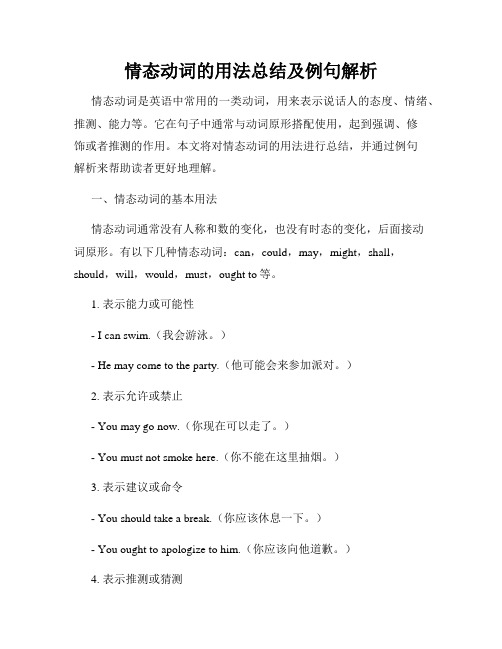
情态动词的用法总结及例句解析情态动词是英语中常用的一类动词,用来表示说话人的态度、情绪、推测、能力等。
它在句子中通常与动词原形搭配使用,起到强调、修饰或者推测的作用。
本文将对情态动词的用法进行总结,并通过例句解析来帮助读者更好地理解。
一、情态动词的基本用法情态动词通常没有人称和数的变化,也没有时态的变化,后面接动词原形。
有以下几种情态动词:can,could,may,might,shall,should,will,would,must,ought to等。
1. 表示能力或可能性- I can swim.(我会游泳。
)- He may come to the party.(他可能会来参加派对。
)2. 表示允许或禁止- You may go now.(你现在可以走了。
)- You must not smoke here.(你不能在这里抽烟。
)3. 表示建议或命令- You should take a break.(你应该休息一下。
)- You ought to apologize to him.(你应该向他道歉。
)4. 表示推测或猜测- He could be there.(他可能在那里。
)- It might rain tomorrow.(明天可能会下雨。
)5. 表示义务或必须- We must finish the project on time.(我们必须按时完成这个项目。
)- You ought to help him.(你应该帮助他。
)二、情态动词的细分用法除了以上的基本用法外,情态动词还有一些特殊的用法,需要注意其具体含义和用法。
1. can 和 could- 表示能力和技能:I can play the piano.(我会弹钢琴。
)- 表示请求或许可:Can I use your computer?(我可以用你的电脑吗?)- could 还可以用来表示过去的能力或许可:When I was young, I could run very fast.(小时候,我跑得很快。
初中英语情态动词知识详解及经典例句
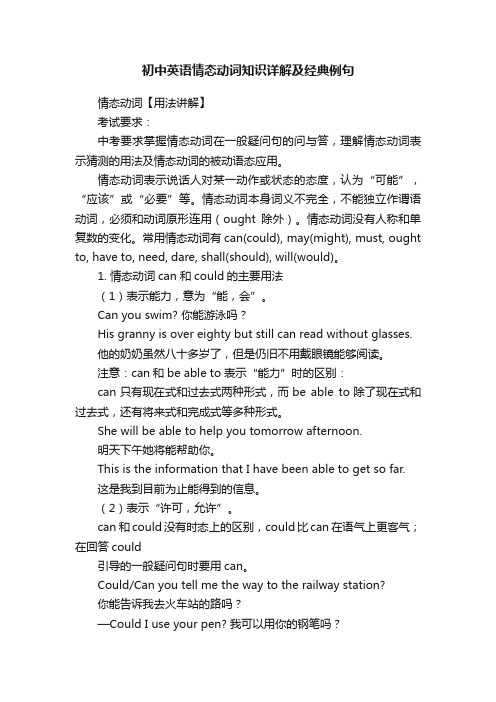
初中英语情态动词知识详解及经典例句情态动词【用法讲解】考试要求:中考要求掌握情态动词在一般疑问句的问与答,理解情态动词表示猜测的用法及情态动词的被动语态应用。
情态动词表示说话人对某一动作或状态的态度,认为“可能”,“应该”或“必要”等。
情态动词本身词义不完全,不能独立作谓语动词,必须和动词原形连用(ought除外)。
情态动词没有人称和单复数的变化。
常用情态动词有can(could), may(might), must, ought to, have to, need, dare, shall(should), will(would)。
1. 情态动词can 和could的主要用法(1)表示能力,意为“能,会”。
Can you swim? 你能游泳吗?His granny is over eighty but still can read without glasses.他的奶奶虽然八十多岁了,但是仍旧不用戴眼镜能够阅读。
注意:can和be able to表示“能力”时的区别:can只有现在式和过去式两种形式,而be able to除了现在式和过去式,还有将来式和完成式等多种形式。
She will be able to help you tomorrow afternoon.明天下午她将能帮助你。
This is the information that I have been able to get so far.这是我到目前为止能得到的信息。
(2)表示“许可,允许”。
can 和could没有时态上的区别,could比can在语气上更客气;在回答could引导的一般疑问句时要用can。
Could/Can you tell me the way to the railway station?你能告诉我去火车站的路吗?—Could I use your pen? 我可以用你的钢笔吗?—Yes, of course you can. 是,当然你可以。
中考英语情态动词语法知识讲解(精品)
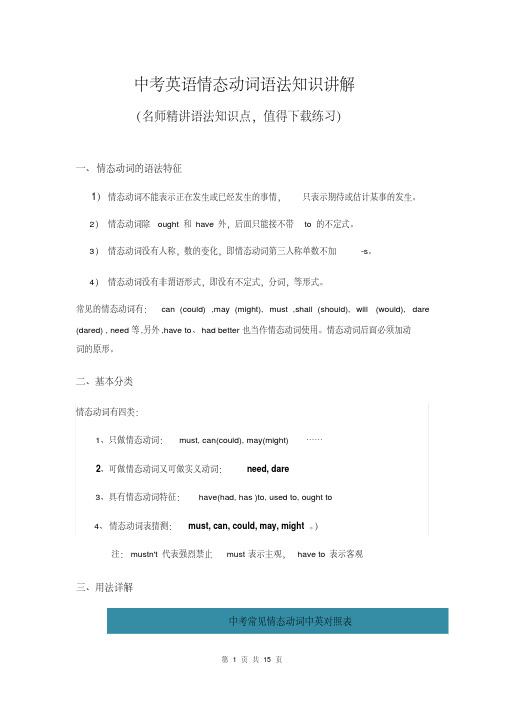
中考英语情态动词语法知识讲解(名师精讲语法知识点,值得下载练习)一、情态动词的语法特征1)情态动词不能表示正在发生或已经发生的事情,只表示期待或估计某事的发生。
2)情态动词除ought 和have 外,后面只能接不带to 的不定式。
3)情态动词没有人称,数的变化,即情态动词第三人称单数不加-s。
4)情态动词没有非谓语形式,即没有不定式,分词,等形式。
常见的情态动词有:can (could) ,may (might), must ,shall (should), will (would), dare (dared) , need等,另外,have to、had better也当作情态动词使用。
情态动词后面必须加动词的原形。
二、基本分类情态动词有四类:1、只做情态动词:must, can(could), may(might)…… 2、可做情态动词又可做实义动词:need, dare3、具有情态动词特征:have(had, has )to, used to, ought to4、情态动词表猜测:must, can, could, may, might。
)注:mustn't代表强烈禁止must表示主观,have to表示客观三、用法详解中考常见情态动词中英对照表must必须、一定can能够、可能shall应该、将要need需要、必要could能够、可能should应该have to 不得不may许可、可以will决心、将要ought to应该might许可、可以would愿意考点1:含有情态动词的疑问句的回答1.对may引出的问句,可以有下列回答方式:Yes, you may. / Yes, of course./ Yes, certainly./ Sure./ No, you can’t.No, you mustn’t.2.对must引出的疑问句,回答方式为:Yes, …must./ No, …don’t have to. / No, …don’t need to.No, … needn’t.3. Could在疑问句中,表示委婉的语气,此时could没有过去式的意思。
初中英语情态动词详细用法归纳(含练习及答案)
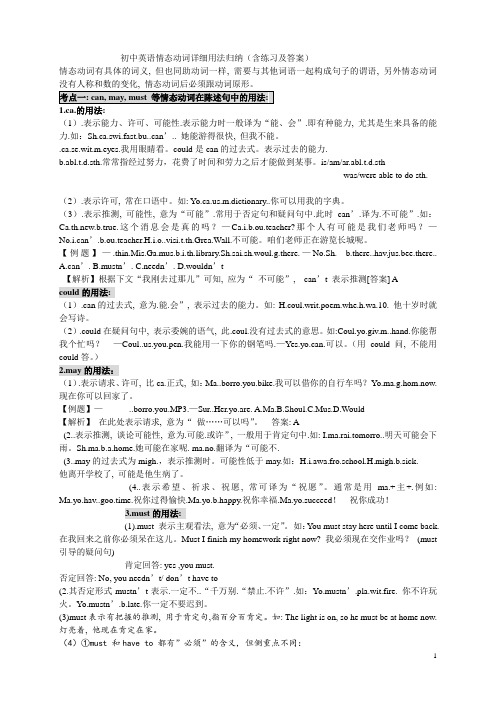
初中英语情态动词详细用法归纳(含练习及答案)情态动词有具体的词义, 但也同助动词一样, 需要与其他词语一起构成句子的谓语, 另外情态动词没有人称和数的变化, 情态动词后必须跟动词原形。
1.ca.的用法:(1).表示能力、许可、可能性.表示能力时一般译为“能、会”.即有种能力, 尤其是生来具备的能力.如:Sh.ca.swi.fast.bu..can’.. 她能游得很快, 但我不能。
.ca.se.wit.m.eyes.我用眼睛看。
could是can的过去式。
表示过去的能力.b.abl.t.d.sth.常常指经过努力,花费了时间和劳力之后才能做到某事。
is/am/ar.abl.t.d.sthwas/were able to do sth.(2).表示许可, 常在口语中。
如: .m.dictionary..你可以用我的字典。
(3).表示推测, 可能性, 意为“可能”.常用于否定句和疑问句中.此时can’.译为.不可能”.如:Ca.th.new.b.true.这个消息会是真的吗?—Ca.i.b.ou.teacher?那个人有可能是我们老师吗?—No.i.can’.b.ou.teacher.H.i.o..visi.t.th.Grea.Wall.不可能。
咱们老师正在游览长城呢。
【例题】—.thin.Mis.Ga.mus.b.i.th.library.Sh.sai.sh.woul.g.there.—No.Sh.__b.there..hav.jus.bee.there..A.can’.B.mustn’.C.needn’.D.wouldn’t【解析】根据下文“我刚去过那儿”可知, 应为“不可能”, can’t 表示推测[答案] Acould的用法:(1).can的过去式, 意为.能.会”, 表示过去的能力。
如: H.coul.writ.poem.whe.h.wa.10. 他十岁时就会写诗。
(2).could在疑问句中, 表示委婉的语气, 此.coul.没有过去式的意思。
初中英语语法大全——情态动词(共25张PPT)

三. must的用法
1.表示必须 must表示必须多指现在或将来的情况,强调说话者的主观语气即说话者认 为有必要或有义务做某事。对其一般疑问句的肯同答用must,否定回答用 needn't或者don't have to。 Everyone must take notes carefully in Professor Liu’s class. Must I finish the work tonight ? ---Yes, you must. --- No, you needn’t /don't have to.
九、had better的用法
1. 表示劝告或建议 eg: You' d better eat these bananas before they go ba d. 2. had better的否定形式 其否定形式是将not直接放在had better的后面。 eg: You had better not miss the last bus.
3.表示请求或允许 (1)用could 比用can更加迟疑不决,当没有把握得到允许或需 要委婉表达时用could。 eg: Could I take this seat, sir, if you don't mind? eg: You can phone me after six this afternoon. 当允许别人做某事时,答语用cause your cell phone for a while? --- Yes, of course you can.
五. will/would的用法
1、表示意愿 表示自愿做或主动提出做建电如意志 愿望或决心等,可用于各种 人称。would是will的过去式。 eg: I won’t argue with you.我不愿意和你争辩。 eg: Jane said she would not go with Tom, for she didn’t like him. 简说她不愿和汤姆一起去,因为她不喜欢他。
七年级情态动词知识点归纳

七年级情态动词知识点归纳在英语学习过程中,情态动词是一个重要的语法知识点。
在初中阶段,七年级学生需要掌握情态动词的用法和意义,以便在口语和书写中运用自如。
本文将对七年级情态动词知识点进行归纳,帮助学生更好地掌握这个难点知识。
一、情态动词的定义和分类情态动词是一类助动词,用于表示能力、意愿、推测、建议等语气和含义。
常见情态动词包括can, could, may, might, must, shall, should, will和would。
其中,can, could, may, might, must表示推测或能力,shall, should, will和would表示意愿或建议。
二、情态动词的用法1. 表示能力:can, could, may, might, must例句:I can play basketball very well. 我打篮球很好。
2. 表示推测:can, could, may, might例句:He can be a doctor in the future. 他将来可能成为一名医生。
3. 表示必须或应该:must, should例句:You must study hard if you want to pass the exam. 如果想要通过考试你必须很努力学习。
4. 表示意愿或建议:shall, should, will, would例句:We should help others whenever we can. 我们应该在能帮助别人的时候伸出援手。
三、情态动词的否定和疑问形式1. 否定形式:在情态动词后加not例句:I cannot speak English fluently. 我不会流利地说英语。
2. 疑问形式:将情态动词放在主语前即可例句:Can you swim? 你会游泳吗?四、情态动词的常见搭配1. can/could + 动词原形:表示能力例句:I can speak Chinese fluently. 我能流利地说中文。
最新初中英语语法知识—情态动词的解析含答案(1)
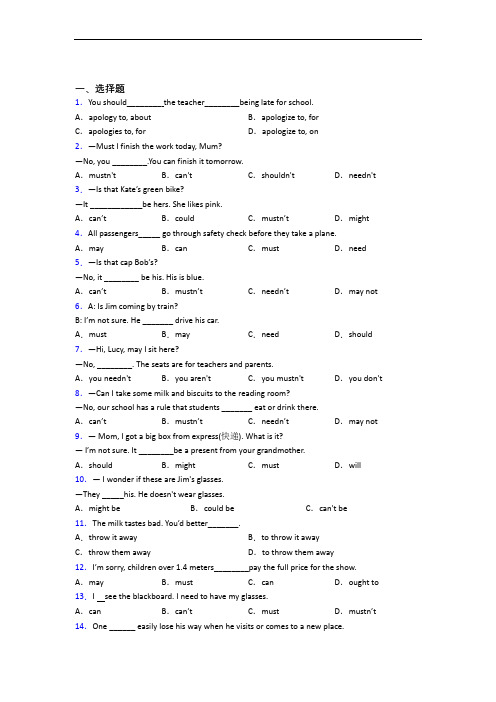
一、选择题1.You should________ the teacher________being late for school.A.apology to, about B.apologize to, for C.apologies to, for D.apologize to, on2.—Must I finish the work today, Mum?—No, you ________.You can finish it tomorrow.A.mustn't B.can't C.shouldn't D.needn't 3.—Is that Kate’s green bike?—It ____________be hers. She likes pink.A.can’t B.could C.mustn’t D.might 4.All passengers_____ go through safety check before they take a plane.A.may B.can C.must D.need 5.—Is that cap Bob’s?—No, it ________ be his. His is blue.A.can’t B.mustn’t C.needn’t D.may not 6.A: Is Jim coming by train?B: I’m not sure. He _______ drive his car.A.must B.may C.need D.should 7.—Hi, Lucy, may I sit here?—No, ________. The seats are for teachers and parents.A.you needn't B.you aren't C.you mustn't D.you don't 8.—Can I take some milk and biscuits to the reading room?—No, our school has a rule that students _______ eat or drink there.A.can’t B.mustn’t C.needn’t D.may not 9.— Mom, I got a big box from express(快递). What is it?—I’m not sure. It ________be a present from your grandmother.A.should B.might C.must D.will 10.— I wonder if these are Jim's glasses.—They _____his. He doesn't wear glasses.A.might be B.could be C.can't be 11.The milk tastes bad. You’d better_______.A.throw it away B.to throw it awayC.throw them away D.to throw them away12.I’m sorry, children over 1.4 meters________pay the full price for the show. A.may B.must C.can D.ought to 13.I see the blackboard. I need to have my glasses.A.can B.c an’t C.must D.mustn’t 14.One ______ easily lose his way when he visits or comes to a new place.A.may B.must C.need D.should 15.—Must I start now?—No, you_______________.A.mustn't B.can't C.needn't D.must16.This book _____ Lucy’s. Look! Her name is on the book cover.A.must be B.may be C.can’t be D.mustn’t be 17.---I heard they went skating in the mountains last winter.---It ______ true because there was little snow there.A.may not be B.won’t be C.couldn’t be D.will be 18.(2017 • 湖北省宜昌市中考)—Life is becoming convenient with the Internet.—That’s true! Almost everything be done online.A.must B.would C.should D.can 19.—Could you help me download some Taylor Swift’s songs from Ku Gou?—Sorry, people download music from the Internet without pay ing, because it’s against the law. A.wouldn’t B.needn’tC.mustn’t D.couldn’t20.—We've prepared all kinds of foods for the picnic.—Do you mean I___ bring anything?A.can't B.needn't C.mustn't D.won't 21.—Who is the lady over there? Is it Miss Wang?—It __________be her. Miss Wang is much taller.A.needn't B.mustn't C.shouldn't D.can't22.You __ drive your car so fast. It's very dangerous.A.wouldn't B.shouldn't C.couldn't D.mightn't【参考答案】***试卷处理标记,请不要删除一、选择题1.B解析:B【解析】【详解】句意:你应该因为上学迟到向老师道歉。
初中英语情态动词完整归纳及解析

初中英语情态动词完整归纳及解析一、选择题1.If you buy your mum an iRobot floor cleaner, she ________ sweep the floor every day. A.can’t B.mustn’t C.needn’t D.shouldn’t 2.To my joy, we_________ go to the bank. Mary has lent us some money. A.shouldn’t B.needn’t C.couldn’t D.wo uldn’t 3.—Do we have to finish this today?—Yes, you ________ . Today is the last day.A.would B.may C.can D.must 4.—Hurry up, Jack! Let’s cross the road as fast as possible.—No, you ________. Don’t you see the light is still red?A.couldn’t B.wouldn’t C.mustn’t D.needn’t 5.—Be careful! Fire ________ be dangerous sometimes.—OK. I will put it out right away.A.mustn’t B.should C.can D.needn’t 6.—Will my car be ready by the end of the day?—It ________ be, sir. I’ll call if there’s any problem.A.must B.could C.shall D.should 7.We shouldn’t throw any objects from the building. Even a small object ________ cause serious injuries or death, when dropped from a great height.A.must B.should C.may D.need 8.—________ you give me a hand? I can’t put up the poster by myself.—No problem.A.Could B.Should C.Need D.Must 9.You'd better __________ hard from now on, __________ you will fail the exam. A.work; and B.working; or C.working; and D.work; or 10.—Where is Tom? I am considering ________ him about the result of the exam.—Oh. You ________. He has known it already.A.to tell; can't B.telling; needn't C.tell; mustn't D.told; shouldn't 11.When you visit a museum, some instructions should ________ and we’d better not________ them.A.pay attention to; be against B.be paid attention; againstC.be paid attention to; against D.be paid attention to; be against 12.—I think they are enough. We ________ make so many chairs.—I don’t think so. Because nearly a quarter of them need ________.A.don’t need to; mending B.needed; to be mendedC.don’t need; mend D.need; to mend13.It’s amazing that the pen ________turn voice into text with few mistakes.A.can B.must C.may D.need 14.You ________ drive after drinking alcohol(酒). It’s against the law.A.mustn’t B.needn’t C.couldn’t D.wo uldn’t 15.— Zoe, what do you think is the greatest advantage of shopping online?— At least I ______ spend much time going from shop to shop.A.shouldn’t B.can’t C.needn’t D.mustn’t16.---Will you be back early this evening?---Yes, but I ________ be a little late. Our boss sometimes has extra work for us.A.may B.must C.need D.will 17.—Amy, I hear you've got many foreign coins._______ I have a look?—Of course, I'll fetch them for you.A.May B.MustC.Should D.Need18.When I was young, my father ___________ take me to climb the hill which was not far from our house.A.may B.must C.would D.should19.You ______ pay too much attention to your pronunciation, as it is so important in the oral (口头的) test.A.shouldn’t B.mustn’t C.can’t D.needn’t 20.—Shall we go camping this summer holiday?—Nothing________be better.A.should B.could C.must D.may21.My bike was broken yesterday,so I____walk home.A.might B.had to C.must D.could 22.—Ready? Let’s get started, Martin.— Swimming? I just ________ get used to it in winter.A.can’t B.needn’t C.mustn’t D.shouldn’t 23.Dr. Zhong Nanshan once said, "To prevent the spread of this disease, we________never be too careful."A.can B.may C.must D.should 24.Don’t cross the road until the traffic lights turn green. A car_______hit you.A.need B.may C.should D.must25.A lot of online resources ________ be used either by teachers at school or parents at home. A.can B.should C.need D.must26.— Is the boy over there Tom? He often wears a jacket like that.— It _______ be him. He is absent from school today.A.needn’t B.shouldn’t C.mustn’t D.can’t 27.—Who is singing next door? It sounds like a young girl’s voice.—It _________ be Jane. But she seldom sings English songs.A.need B.must C.may D.can28.To avoid ________, we’d better ________ the parents’ meeting online.A.gather; hold B.gathering; hold C.gather; holding D.to gather; to hold 29.—How do you like my new dress?—Well, if I ________ say, it is not suitable for you.A.may B.must C.have to D.should 30.—Must the children leave at six tomorrow morning?—No, they _______. They can have more time to get ready for the trip.A.can’t B.needn’t C.mustn’t D.may not 31.—What is that young lady’s job?—She ________ be a nurse, I’m not sure.A.must B.may C.need D.would 32.According to the rule, used batteries ________ be dropped in the red bin for harmful wastes. A.may B.would C.should D.might33.You _________ smoke here! Look at the sign. It says "No smoking".A.needn't B.mustn't C.can D.may34.—Must I finish all my homework today, Mum?—No, you ________, my dear. You can finish some tomorrow if you like.A.needn’t B.shouldn’t C.can’t D.mustn’t35.We've discussed every detail of this plan and have got everything ready. But still something ________ go wrong. We still have to be very careful.A.must B.should C.would D.may36.—Suzy described every detail of the accident just now.—Her memory ________ be completely back.A.shall B.need C.must D.could37.You ________ be careful with the camera. It costs!A.can B.will C.should D.may38.—In China, many parents complain that their children have to stay up late to do the homework.—Don’t worry. The government has realized the problem. I’m sure there ________ be good news soon.A.can B.should C.need D.must39.—Is it really necessary for me to go shopping with a mask on?—I’m afraid you ________ in public. It is not only to protect yourself but also to protect others. A.must B.should C.can D.need40.When people are waiting at the zebra crossing, cars and buses ________ wait and let them go first.A.must B.may C.can D.need41.—Shall I tell him the change of the time right now?—I’m afraid you ________, otherwise he will be late for the meeting.A.can B.may C.must D.need42.Look at the floor, Tom! ________ you watch TV while having a meal?A.Should B.Could C.Must D.May43.Cars ________ give way to walkers on some roads in Binhai, or the drivers will be fined. A.may B.will C.can D.must 44.Sometimes smiles ________ be false, hiding other feelings like anger, fear or worry. A.should B.would C.must D.can45.You’ve go t an A in the maths test again. You ________ be good at it.A.can B.may C.must D.should46.For the safety of the passengers, objects like guns ________ be carried on board.A.may not B.needn’t C.might not D.mustn’t 47.—The article says that a person’s anim al sign decides his personality.—You ________ read it for fun, but don’t believe in that.A.can B.must C.shouldn’t D.needn’t48.— What do you think of the show yesterday?— Some of them were really good but others ________ be better.A.will B.must C.need D.can49.—In China, many students have to stay up late to do their homework.—No worries. The government has realized the problem. I’m sure there ________ be good news soon.A.can B.should C.must D.need50.— Mum, why do I have to wash hands so many times a day?—You ________ be too careful, for your health.A.can’t B.mustn’t C.may not D.needn’t【参考答案】***试卷处理标记,请不要删除一、选择题1.C解析:C【详解】句意:如果你给你妈妈买一台扫地机器人,她就不必每天扫地了。
情态动词用法归纳全解

疑问句构成及回答方式
一般疑问句
将情态动词提到句首,如“Can you speak English?”(你会说英语吗?)回答时一般 用yes或no,如“Yes, I can.”(是的,我会 。)
反意疑问句
在陈述句后面加上一个简短的疑问句,如 “He can swim, can't he?”(他会游泳, 不是吗?)回答时根据实际情况进行回答。
对主语提问
当主语是人时,可以用who或whom来提问;当主语是物时,可以用what来提问。同时要注意语序的调整 ,如“Who must go there?”(谁必须去那里?)
对时间、地点等状语提问
用when、where等疑问词来提问,并根据需要调整语序,如“When must we arrive?”(我们必须在什 么时候到达?)
使用"might"来表示更委婉、更不确定的建议, 如"You might want to consider another option."(您可能需要考虑另一个选项。)
使用情态动词的过去式来表达礼貌性请求,如 "Would you mind closing the window?"( 你介意关上窗户吗?)
禁止性规定或命令执行场景
使用"must not"或"can't"来表示禁止性规定或命令, 如"You must not smoke here."(你不能在这里吸烟
。)
使用"don't have to"来表示不必做某事,如"You don't have to come if you don't want to."(Fra bibliotek果作用
初中英语语法知识—情态动词的分类汇编含答案解析

一、选择题1.—Can you come to my party on Saturday afternoon?—Sorry, I can’t. I ________ meet my friends.A.can’t B.might have to C.needn’t2.You run with the train when it is coming. It’s dangerous.A.may not B.mustn’t C.needn’t3.-Listen! A wolf is crying!-It _______ be a wolf, because a wolf never comes out at this time.A.mustn’t B.needn’t C.can’t D.don’t 4.(2018·山东临沂) Could you please speak a little louder? I ______ hear you very well. A.can’t B.mustn’tC.shouldn’t D.needn’t5.—________your house be cleaned right now?—No,it needn't.It may be cleaned this afternoon.()A.Must B.May C.Can6.—Can we walk across the road now?—No, we . We have to wait until the light turns green.A.couldn’t B.needn’t C.shouldn’t D.mustn’t 7.---Mum, must I finish my homework today?---No, you . Tomorrow is Sunday and you may have a rest today.A.shouldn’t B.mustn’t C.can’t D.don’t have to 8.— Mom, I got a big box from express(快递). What is it?—I’m not sure. It ________be a present from your grandmothe r.A.should B.might C.must D.will 9.You __ drive your car so fast. It's very dangerous.A.wouldn't B.shouldn't C.couldn't D.mightn't 10.—I’d like ________ Guo Jingming’s Tiny Times.—You had better________ his books. The stories he tells are far from real life. A.buying, don’t read B.to buy, not readC.buying, not read D.to buy, not to read11.—Sorry, Ms Wang. I left my homework at home. Must I hand it in today?—No, you_______ . You_______ bring it here tomorrow.A.mustn’t; should B.needn’t; must C.mustn’t; may D.needn’t; can 12.I’m sorry, children over 1.4 meters________pay the full price for the show.A.may B.must C.can D.ought to 13.He like coffee. I see him drink a cup at times.A.must B.may C.can’t D.mustn’t 14.—Look! Mrs. Smith is standing in front of the teaching building.—It______ her. She has gone to Egypt for her holiday.A.must be B.mustn’t be C.can be D.can’t be 15.—Jenny, we buy Mom presents. We can clean the house from top to bottom.—Good idea! It’s a special present for Mother’s Day.A.can’t B.mustn’tC.shouldn’t D.needn’t16.— May I have some wine?— No, you . You have to drive home later.A.shouldn't B.needn't C.mustn't D.may not 17.When I write down what I am showing thanks to, it’s always for things that money______buy.A.needn’t B.shouldn’t C.may not D.can’t18.–Is Mike coming to the fashion show tomorrow?--I’m not sure. He ______ not come.A.must B.can C.may D.should 19.—Could you help me download some Taylor Swift’s songs from Ku Gou?—Sorry, people download mus ic from the Internet without paying, because it’s against the law. A.wouldn’t B.needn’tC.mustn’t D.couldn’t20.一Already five people in the taxi, but the driver managed to take me as well.一Terrible, and it be an uncomfortable journey.A.can B.should C.must D.need21.—I often see Maria in the library, and she _________ like reading best.—That’s right.A.need B.may C.must D.can 22.—Doesn’t Frank like staying at home and looking after his little sister?—_______, but he ________ because both of his parents work.A.Yes; has to B.No; has toC.Yes; doesn’t have to D.No; doesn’t have to【参考答案】***试卷处理标记,请不要删除一、选择题1.B解析:B【解析】【分析】【详解】句意:——星期六下午你能来参加我的派对吗?——抱歉,我不能。
- 1、下载文档前请自行甄别文档内容的完整性,平台不提供额外的编辑、内容补充、找答案等附加服务。
- 2、"仅部分预览"的文档,不可在线预览部分如存在完整性等问题,可反馈申请退款(可完整预览的文档不适用该条件!)。
- 3、如文档侵犯您的权益,请联系客服反馈,我们会尽快为您处理(人工客服工作时间:9:00-18:30)。
一、选择题1.A: Is Jim coming by train?B: I’m not sure. He _______ drive his car.A.must B.may C.need D.should2.—I’d like ________ Guo Jingming’s Tiny Times.—You had better________ his books. The stories he tells are far from real life.A.buying, don’t rea d B.to buy, not readC.buying, not read D.to buy, not to read3.—Must I finish the work today, Mum?—No, you ________.You can finish it tomorrow.A.mustn't B.can't C.shouldn't D.needn't4.-Listen! A wolf is crying!-It _______ be a wolf, because a wolf never comes out at this time.A.mustn’t B.needn’t C.can’t D.don’t5.— Do you think it is safe to shop online?— I think so. On Taobao, customers return goods with no questions asked,but they ______ pay delivery costs.A.can’t; can B.must; must C.can; have to D.mustn’t; can 6.―I can't stop smoking, Doctor.―For your health, I'm afraid you .A.must B.can C.need D.have to7.The designer has tried every possible way to make the robot light, so you _____ worry about its weight.A.must B.may C.can’t D.needn’t8.—Is that Kate’s green bike?—It ____________be hers. She likes pink.A.can’t B.could C.mustn’t D.might9.—________your house be cleaned right now?—No,it needn't.It may be cleaned this afternoon.()A.Must B.May C.Can10.—Have you heard about the temperature of the earth will rise to 59℃ in 2020?—Don’t worry! The news _______ be true.A.must not B.may not C.needn’t D.will not11.---Mum, must I finish my homework today?---No, you . Tomorrow is Sunday and you may have a rest today.A.shoul dn’t B.mustn’t C.can’t D.don’t have to 12.—Must we finish the work right now?—No, you ________. You can do it tomorrow.A.needn’t B.shouldn’t C.mustn’t D.can’t 13.—Jenny, you _________ push your way onto the bus.—I’m really sorry about it.A.mustn’t B.ne edn’t C.may not14.You should________ the teacher________being late for school.A.apology to, about B.apologize to, forC.apologies to, for D.apologize to, on15.—I feel tired.—You ________ go to bed so late.A.must B.shouldn’t C.should 16.(2017·甘肃白银·10)—I wonder if these are Danny's glasses.—They________be Danny's. He doesn't wear glasses.A.can't B.must C.mustn't D.can 17.This book _____ Lucy’s. Look! Her name is on the book cover.A.must be B.may be C.can’t be D.mustn’t be 18.— Must I go home? — No, you ________.A.can’t B.mustn’t C.don’t D.needn’t 19.—The food ________be delicious . You ate it up .—You bet . My mum cooked it for me .A.must B.may C.can D.need 20.—Must I sleep now? —No, you________.A.needn't B.mustn't C.can't D.may not 21.—Must I hand in my reports today?—No, you ________.A.mustn’t B.can’t C.shouldn’t D.don’t have to 22.—Can we walk across the road now?—No, we . We have to wait until the light turns green.A.couldn’t B.needn’t C.shouldn’t D.mustn’t 【参考答案】***试卷处理标记,请不要删除一、选择题1.B解析:B【解析】【详解】句意:——吉姆坐火车来吗?——我不确定,他可能开自己的车。
考查情态动词辨析。
A项,必须,一定,表示肯定推测;B项,也许,表示有可能;C项,需要;D项,应该。
根据回答部分I’m not sure.可知,此处并不确定吉姆是开车来还是乘坐火车来,所以此处是“可能”。
故选B。
【点睛】must意为“必须,应该”,可以表示主观上一定要做什么或者肯定推测。
例如:I must go home to look after my mum. This pair of shoes must be hers. may意为“可以,也许”,可以表示请求或者推测(无法断定)。
例如:May I come in? It may be hers,but I’m not sure. need意为“需要”,既是情态动词也是行为动词。
例如:You needn’t finish your homework right now. You need to tell him the truth. should意为“应该”,表示责任或者义务。
例如:You should finish practising playing the piano at first.2.B解析:B【解析】【详解】句意:——我想买郭敬明的《小时代》。
——你最好不要读他的书。
他讲的故事与现实生活相去甚远。
考查非谓语动词及固定句型。
短语would like to do sth.愿意去做某事;第一空排除AC;You had better+动词原形,你最好做某事;You had better not+动词原形,你最好不要做某事。
第二空排除D。
根据题意,故选B。
3.D解析:D【解析】【详解】句意:-我必须今天做完这个工作吗,妈妈?-不,你不必。
你可以明天完成。
mustn’t禁止,不要;can’t不能,不会;shouldn’t不应该;needn’t不必,没有必要。
Must 的一般疑问句,肯定回答用must,否定回答应用needn’t。
故选D。
4.C解析:C【解析】【详解】句意:--听! 狼在叫! --它不可能是狼,因为狼从来不会在这个时候出来。
A. mustn’t禁止;B. needn’t没有必要;C. can’t不可能;D. don’t构成一般现在时的否定句。
根据“because a wolf nev er comes out at this time因为狼从来不会在这个时候出来”,可推断它不可能是狼,故选C。
【点睛】情态动词表推测的用法:can表示“可能”;can’t表示“不可能”;may表示“可能”,must表示“一定”,注意mustn’t表示“禁止”不表示推测,表示否定推测要用can’t.5.C解析:C【详解】句意:——你认为网上购物安全么?——我觉得是的。
淘宝上,消费者可以无理由退货,但是他们要承担运费。
考查情态动词辨析。
A. can’t; can不能,能;B. must; must必须,必须;C. can; have to可以,不得不;D. mustn’t; can禁止,能。
根据句意表示的是顾客能退货,是可以,第一空用can;但是不得不承担运费,非主观情愿用have to。
故选C。
6.D解析:D【解析】【详解】句意:——我不能戒烟,医生。
——为了你的健康,恐怕你得这么做。
考查情态动词辨析。
must必须,强调主观意愿;can能,表能力或许可;need需要,指有必要;have to必须,强调客观需要。
根据“For your health为了你的健康”,可知无论愿不愿意戒烟是健康所需,故选D。
7.D解析:D【解析】【分析】【详解】句意:设计者已经尝试了所有可能的方法使机器变轻,所以你不必担心它的重量。
must必须;一定;may可以;可能;can’t不能;不可能;needn’t不必,没有必要。
根据句意The designer has tried every possible way to make the robot light可知,设计者在努力使机器变轻,所以担心是没有必要的。
